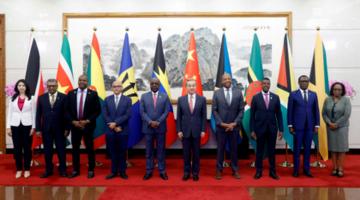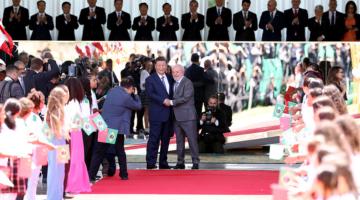Growing socialist and people's democratic projects, as in China and Bolivia, must be seen as examples of how revolutionary forces in the United States can build a system of governance.
China’s political form is called ‘Socialism with Chinese Characteristics.' Chinese scholar Zhang Weiwei calls the Chinese political content ‘whole-process people’s democracy’. He distinguishes this model from the formulaic, procedure-obsessed, and anti-democratic model of the North American Republic and European social democracies. What separates the Chinese model from the political model of the central capitalist formations are a number of variables: firstly, mass participation from top to bottom is a key feature of Chinese socialism. Secondly, the subordination of the capitalist class to the party-state and thus the imperatives of the masses defines China’s ability to develop a socialist market economy. Thirdly, the inclusion of all ethnic minorities in a regulated system of national unity which makes room for cultural autonomy. Finally, and this is intimately related to the first and second variables, is a system of central planning as opposed to the limited and chaotic time horizon of capitalist development.
While in social scientific terms, all one-to-one comparisons between two different state formations contain seeds of incongruence, it is fair to say that China and the North American Republic can be compared side by side due to their geographic and demographic size, natural resource endowment, and current influence in the world-system (though, power is quickly shifting away from the North American Republic). This essay seeks to highlight the positives of China’s ‘whole-process people’s democracy’ through a critique of the North American Republic’s procedural and highly exclusive political structure. The case of Bolivia’s political experience in building a ‘plurinational state’ will be brought in as a means of highlighting how the indigenous question (variable three) can and has been handled in the Americas, since China’s 55 ethnic groups face wholly different circumstances and relationships to the dominant group. I will not validate the claims of ‘Han settler colonialism’ of ASPI and other western arms dealer sponsored ‘research’, but I will leave this critique of their work for readers if they so choose to enter that rat’s nest of lies.
Mass participation in the political processes is something relatively new in China, with the revolution of 1949 empowering the workers and peasants to embark upon socialist construction vis-a-vis the dictatorship of the proletariat. For centuries in imperial China, a highly educated civil service formed the intermediate layer between the imperial authorities and the masses of peasants, workers, and shopkeepers. Since the 1949 revolution, especially during the years when Mao Zedong was chairman of the CPC, there have been explosions of mass participation in the economy which have improved the Chinese people’s standard of living manyfold. This was done by planning a streamlined yet differentiated economic path for both the city and the countryside. The best aspects of the great proletarian cultural revolution included sending doctors, engineers, and teachers to the countryside to live among the masses and bring healthcare, literacy, and economic development. The current president, Xi Jinping, was one of these educated youths who went to the countryside and immersed himself in the life of the masses before his political career. Another feature of mass participation in the Chinese whole process people’s democracy is the National People’s Congress (NPC), the largest parliamentary body in the world, with 2,977 members representing all sectors of Chinese society. Every March, Beijing hosts the Chinese People’s Political Consultative Congress (CPPCC), where leaders from all of the ethnic minority groups and autonomous regions are given an opportunity to interface with the central government to voice their concerns, bring further development projects to their region, and otherwise express their culture freely. Contrast this with the North American Republic, where cultural expression is commodified at best and stifled at worst.
Neither the NPC or the CPPCC would be possible without the subordination of the capitalist class in China to the demands of the masses of workers and peasants represented by the Communist Party of China. Many on the left in the North American Republic are very loud about their opposition to China’s policies, especially from the late 1970s onward; capitalist restoration is how this is usually described. By intentionally developing the most important and strategic sectors along socialist lines and allowing for private enterprise under party control, China has grown year on year and improved the lives of their citizens precipitously. According to Deng Xiaoping:
“We welcome foreign investment and advanced techniques. Management is also a technique. Will they undermine our socialism? Not likely, because the socialist sector is the mainstay of our economy. Our socialist economic base is so huge that it can absorb tens and hundreds of billions of dollars’ worth of foreign funds without being shaken. Foreign investment will doubtless serve as a major supplement in the building of socialism in our country.”
Deng’s assessment of the situation has certainly come to pass, and while problems certainly arose in the execution of reforms and ‘opening up’ (corruption, development of the eastern seaboard over the inland regions) these issues are being addressed today. Since the beginning of President Xi Jinping’s tenure, his focus has been on rooting out corruption from the party and the state enterprises more generally. Even NPR–the mouthpiece of Democratic Party liberalism–has aired interviews which could not help but praise the reduction of corruption and the party thumb pressing down on the elites. The interview between Robert Siegel and Minxin Pei went as follows:
SIEGEL: Well, if all of this is common to daily life in China, does Xi Jinping get some credit for improving all of this and making bribes less common in everyday life?
PEI: Oh, definitely. I think one of Xi Jinping's strategies, ironically, is not that dissimilar from Donald Trump's. He's draining the swamp. And he's drained quite a bit of swamp at least in the short term. So he has gained quite a bit of public support for making Chinese officials at least less overtly corrupt.
The comparison to Trump is a symptom of shortsighted liberalism, but the point remains that the CPC is cleaning up corruption and directing development towards building socialism. In the midst of the pandemic, absolute poverty was eradicated from China. The Chinese state also banned the construction of new coal mines or coal processing facilities abroad, and has instead been developing both an internal and external market for renewable energy: mainly solar and hydro power. All of this has positive results for the development of China’s socialist market economy, clearing of smog in big cities, increases in pay for workers, and the development of real green industrialization alongside urbanization. A critical factor of whole process people’s democracy is that the Chinese bourgeoisie has not been able to form a coherent, politically powerful class, capable of taking state power. The subordination of capitalists to the party has also yielded positive results in research and development of new technologies; Chinese cancer researchers have developed a new treatment which has shown immensely positive results in eradicating cancer cells from the body. Chinese geological scientists have also made a breakthrough in mining technology, according to the South China Morning Post: “this innovative method based on electric fields has managed to recover 95 per cent of rare earths, while simultaneously reducing mining time by 70 per cent and cutting electricity use by 60 per cent”.
All of this can be contrasted with the North American Republic’s stubborn refusal to even pursue modest reforms of its procedural and rigid anti-democratic governance. While homelessness rates are skyrocketing, the cost of living is increasing, and Immigration and Customs Enforcement (ICE) gestapo-like agents are ripping students and protestors off the streets for criticizing “Israel” there seems to be no response from the government to even pretend to listen to their constituency.
In the background are two important economic shifts: firstly Trump’s tariff policies, which are ushering in a collapse of the stock market. Secondly, the Chinese large language model Deepseek has popped the speculative AI financial bubble emanating from Silicon Valley and Austin, Texas. What does this mean? Together, these two factors show a decaying empire which is not producing economic innovation, but rather jumping from financial crisis to financial crisis due to the divorce from material production and towards financial services and money markets. China’s socialist central planning allows the country to set development goals, while also providing the economic stability for people to start businesses, earn living wages, and innovate in their business models. According to Jabbour, Dantas, and Espindola: “Chinese socialism, while “making” a market economy ended up creating conditions for the renewal not only of the Chinese material foundation, but also of socialism as a developmentalist project, posed as an alternative to the current financialized order of capitalism”. Central planning is where the Chinese socialist economic sector shines, allowing the country to develop along planned lines while avoiding the pitfalls of speculation, hyper-financialization, and lumpen-development.
This socialist market economy would not be possible without the full participation of Chinese society, as mentioned above. Given the key differences in ethnic makeup in China vs the North American Republic, Bolivia’s socialist, ‘plurinational’ state provides a touchstone of comparison worth examining in relation to ethnic and racial tensions. Plurinationalism is a concept laid out by Bolivia’s indigenous social movements of the 1980s, which highlights the plurality of nations and peoples living inside the colonially drawn borders. Thus, plurinationalism is an attempt by the Bolivian state–-under the leadership of Movimiento Al Socialismo (MAS)--to bring indigenous rights to the forefront, given that the various indigenous peoples make up the majority of the population. The North American Republic could benefit from a synthesis of Bolivian plurinationalism (given the indigenous population and large populations of ethnic minorities) and Chinese whole process people’s democracy (given the size of the population and geographic area). While this is speculative at this point, it seems that a few positive outcomes could arise if this were undertaken.
Firstly, by revisiting treaties such as the Fort Laramie Treaty signed by the Lakota nation and the US Government, indigenous land rights could be restored within a larger project of socialist development. By giving indigenous peoples their rights to the land, subsoil, and regional development, traditional land use practices could combat climate change and deforestation, while also restoring wildlife and encouraging cultural development. Similarly, revisiting the Black Belt Thesis in the American south could create a scenario in which institutions such as mass incarceration and structural racism are dismantled in favor of a geographic area where the Black Nation is allowed to develop culturally, economically, and socially while still contributing to a plurinational fabric of statecraft. Usually, this position is misrepresented by socialists and social democrats in the North American Republic as some sort of ethnic segregation or Balkanization of the country. This could not be further from the truth. ‘Land Back’ does not have to mean undoing the victories won by Americans in the Civil War (abolishing slavery, encouraging republicanism) or the Civil Rights Movement (racial equality under the law, promotion of ethnic identity and culture for minority groups). Rather, land back means respecting the treaties signed with the indigenous peoples and fully embracing reparations for Black Americans without reducing these things to monetary payouts or government programs which under the current framework do more harm than good.
In a scenario of ‘Socialism with American Characteristics’, our unique national, cultural, political, and economic contradictions would be the crux of the issue. I am not proposing a blind copy-paste of Chinese socialism or Bolivian Plurinationalism, because this is not possible. Rather, I am inserting myself into a debate about the national question in the North American Republic which has so far been dominated by misguided voices on either side. On the one hand, the ‘Patriotic Socialists’ or ‘MAGA Communists’ have–correctly–begun to tarry with the fact that in all the world’s socialist revolutions, an element of patriotism and love of one’s land shaped the political discourse and revolutionary changes.
Yet, their analysis stops short of revolutionary patriotism and ends up mimicking provincialist particularism and xenophobia of the current American patriotism. On the other hand, the anarchist and social democratic positions (while containing variance) inevitably end up reproducing the idea that there is nothing salvageable in this country, and in fact this country needs to be destroyed by external forces and rebuilt from the ashes. This ‘embarrassment of being American’ is just repackaged American exceptionalism masquerading as internationalism. Should the American ruling class be subdued and expropriated? Absolutely. Does this involve a rethinking of proletarian patriotism responding to uniquely American conditions? Yes. Yet, a clear and sober analysis of the existing conditions, forces, and relations of production must go hand-in-hand with the political analysis.
China and Bolivia provide clear examples of socialist governance, indigenous rights, and economic democracy. While the North American Republic cannot copy and paste these policies, they provide a framework and a blueprint which can be altered to fit American conditions. The current political moment calls for bold redefinition of our political trajectory, and the organized left mustn't be afraid to heed this call. We also mustn't fall in line with the anti-China propaganda which we are berated with every day. We do not need to reinvent the wheel, we need to build internationalist bonds and forge a socialism fit for our time and place.
Hanna Eid is a Palestinian American writer, researcher, and Union electrical worker. His writing concerns mainly imperialism and anti-imperialism in west Asia and west Africa.



















